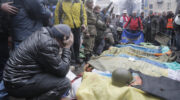Perseverance Europe
For this Ukrainian veteran, why Russians fight is still a puzzle
| View caption Hide caption
Resilience or stubbornness? In the yearslong conflict between Russia and Ukraine, and in the last 18 months of war, it’s a matter of perspective. We talk to a veteran Ukrainian artillery commander during a brief break from the counteroffensive.
The Monitor first met the artillery commander on a frozen field in February, as his unit pummeled Russian positions daily with a captured 152 mm gun they named Revenge.
This hot summer day, with a nod to the mounting and very public pressures on Ukraine to deliver progress on the battlefield, he notes with a wry, gold-toothed smile that he officially “can’t say anything about the counteroffensive” or risk “going to jail.”
But under a canopy of grapevines in the garden of a village house made available to his unit – while half of the soldiers are delivering ammunition, the other half digging trenches, and all awaiting repair of their new, main gun – Kirik muses about Ukrainian resilience, Russian stubbornness, and this wretched war.
“Of course, Russians are learning from their mistakes. They learned some stuff from us, and from their mistakes,” says Kirik, chain-smoking as artillery duels rumble over the horizon. “Everyone is tired” of improved Russian defenses, “and is doing what they can together,” he says.
“I can’t say the Russian army is weak. They have more ammunition and people,” says Kirik. “But they are losing this war; why do they still go to conscription offices?”
The Russians “keep coming”
The house’s small backyard table is cluttered with a smorgasbord of stuff: a red Porsche cigarette lighter; a three-hook #1 fishing lure with green, yellow, and orange stripes; coffee cups stained with overuse; and mosquito coils to burn at dusk.
For eight years Kirik has been in the military, on the front lines ever since 2015, a year after Russia and local separatist proxies took control of parts of eastern Donetsk and Luhansk regions, and all of the Crimean Peninsula. Cutting Russia’s supply lines to Crimea is a main goal of the Ukrainian counteroffensive.
Throughout that time – and despite working for a few years in Russia before the war – he says he has wondered often about the motivations of those fighting on the other side, and what they seek to gain.
View caption Hide caption
“What amazes me a lot in the last one and a half years is that the stupid Russians – they keep coming,” he says. “There are so many body bags and coffins going back to Russia, and hundreds of bodies are still left in the treeline. … How much more can they keep doing that?
“Don’t you see the news?” he asks, as if addressing the Russian fighters. “Check the news: Here [in Ukraine] you are retreating.”
He says he is busy, and “working” all the time, as one cog in a Ukrainian war machine that is spread across a 600-mile front to counter invading Russian troops.
Kirik has become a TikTok sensation; to crowdfund donations to the military, he paints artillery shells with bespoke messages before firing them. Now, the fan of Metallica and Nirvana engraves high-caliber machine gun shells with his battalion number, for charity, and collects battle artifacts from the front.
Back in February, snow and ice caked the muddy fields where Kirik’s squad played war games – sometimes against Russian soldiers, who were also gaming online – until they were given target coordinates of enemy positions around Donetsk.
“Why did the … Russians bring this gun here, so we can kill their own people – and they keep giving us ammo?” Kirik said at the time. By then, his squad had already fired some 3,000 shells, all of them captured, through the howitzer.
“Do you know how many Russians we have killed with their own guns?” he asked.
Zelenskyy vs. Putin
Kirik’s unit has since had a hardware upgrade, but the war grinds on.
He recalls living in Russia a decade ago, and how strong the propaganda was on state-run television, which reported wistfully about the days of the Soviet Union, and about the good work of the Russian government and, of course, of President Vladimir Putin.
“Some time ago, I had a chance to become a citizen of Russia,” says Kirik. “I can’t imagine what I would do now. Fight in the army?
“Even if you live in an information black hole, you can see that [Ukrainian President Volodymyr] Zelenskyy is not afraid of anything, and goes everywhere on the front line,” he says.
“Putin has three layers of security at the Kremlin and has not once been on the front. As a Russian citizen, how can you follow these people, these cowards?” asks Kirik. “This [Ukraine] is a country of brave people.” The Russian leader reportedly made a nighttime visit to occupied Mariupol in March and visited the Kherson region in April.
During his obligatory military service decades ago, Kirik says he was with many senior officers from the Crimea and Donetsk regions, and he is sure that he is “fighting a few of them today.”
His separatist friend
Reflecting on how pro-Russian Ukrainians think about separatism, Kirik tells the story of a friend he grew up with, who he says was typical, and whose parents lived in Donetsk city.
The boyhood friend called Kirik in 2014, before Russian troops and a proxy force of local separatists seized control of eastern Ukraine and captured Crimea.
“He said, ‘Join us; let’s fight Ukrainian nationalism. We have camps and get paid $100 a day,’” Kirik recalls his friend telling him. Later in the year, the friend appeared on Ukrainian television, a captured prisoner of war.
View caption Hide caption
“I was surprised how someone could be brainwashed,” says Kirik, adding that he expected the friend to have been released and taken up arms again, on the Russian side. “I am sure he is now dead in the forest.”
When he worked in Russia in 2012 and 2013, Kirik says he encountered examples of separatist attitudes. When asked where people were from, for example, instead of saying “Ukraine,” some would reply, “I am from Crimea” or “Donbas,” both areas with particular historical ties to Russia.
“In every country, there are always people who are patriotic, and others who don’t like the government, who are not happy with anything – even if you put a gold toilet in their room,” says Kirik.
He is shocked when fellow citizens are nostalgic about the former Soviet Union.
“People say it was amazing living in the USSR. Then you ask them, ‘What was good?’” says Kirik. “I remember a lack of food and products, and closed borders.”
Challenge posed by collaborators
Likewise, he is surprised by Ukrainian collaborators with Russia in occupied territories, given the example of deprivation in long-occupied regions, and much of Russia itself.
“What did they expect, when everything is just miserable, and their economy is going down? But still, they wait for the Russians and for Russian world,” says Kirik, referring to a Moscow campaign to consolidate cultural control over occupied Ukrainian territory.
“The propaganda level is very high … but you can also see how far the quality of your life has dropped,” he says. “I don’t know what is in their minds.”
Still, there is no shortage of pro-Russian Ukrainians in occupied areas, which will complicate Ukraine’s advance.
“It’s always hard to have a fight for territory on which they have a lot of collaborators. In Crimea, they were waiting for years for Russians; it’s harder to fight,” he says.
By contrast, the places where Ukraine last autumn made sweeping gains, by pushing Russian forces out of the northeast Kharkiv region and the southern city of Kherson, were made “easier” because “people were resisting [the occupation] very much,” he says.
“That helped us a lot. Not many people were waiting for the Russians there,” says Kirik. “A lot of people were waiting for the Ukrainians to return.”
Asked if he will next be seen in liberated Crimea, Kirik laughs, then turns serious.
“Of course, to get to Crimea requires a lot of hard work. You have to be realistic,” says Kirik. “We can talk about Crimea only when we are approaching Crimea – and we are not there yet.”
Reporting for this story was supported by Oleksandr Naselenko.




